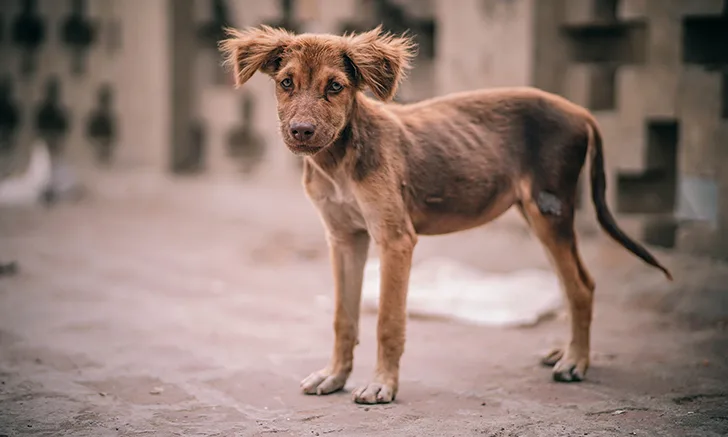Mission Rabies: The Path to the Final Rabies Generation

Sponsored by Merck Animal Health
Rabies is one of the oldest diseases known to humankind, and unfortunately, once clinical signs are present, the disease is universally fatal. Despite advances in medical knowledge and treatment over the years, there are still nearly 59,000 human deaths from rabies each year, with nearly half of those deaths occurring in children.1
More than 99% of human rabies cases are caused by a bite from an infected dog,2 despite the fact that rabies is 100% preventable by vaccine. This lack of vaccination has resulted in the killing of millions of healthy dogs every year due to the fear of this deadly disease. Science has shown that the most effective way to eradicate rabies is mass vaccination, and researchers have demonstrated that human deaths can drop to 0 if just 70% of a stable population of dogs in a local area are vaccinated.3
Rabies in Goa, India
According to the World Health Organization (WHO), 95% of human rabies cases occur in Africa and Asia.4 As such, Mission Rabies, a charity dedicated to rabies education and eliminating rabies worldwide by using a strategic, One Health-focused approach, launched their first vaccine drive in 2013 in Goa, India, where one-third of all human rabies cases occur.4 Within 30 days, 61,143 dogs were vaccinated with the help of international volunteers (sponsored by Merck Animal Health) from 14 countries who had joined forces with local dog catchers and veterinary team members. Additional vaccine drives, sterilization campaigns, and educational awareness programs have continued each year since in Goa.
Veterinarian Bonnie Chu of Houston, Texas, volunteered with the 2019 drive in Goa, and wrote, “After learning about rabies and the vast impact it has on both the human and dog populations in India, I longed to help combat rabies in a way I have never experienced. I had an incredible, unforgettable 2 weeks on this campaign. The local Mission Rabies team members were incredibly hard-working, talented, and inspiring, and their passion for animal welfare is evident in their work. Working alongside them, I personally vaccinated ≈650+ dogs against rabies in 2 weeks, with a grand total of 6,000+ dogs vaccinated during our campaign. The volunteer experience left me with unforgettable memories of Goa, Mission Rabies, and lifelong friendships.” More on Dr. Chu’s experience in Goa can be found at cliniciansbrief.com/article/greetings-goa.
"Working alongside them, I personally vaccinated ≈650+ dogs against rabies in 2 weeks, with a grand total of 6,000+ dogs vaccinated during our campaign. The volunteer experience left me with unforgettable memories of Goa, Mission Rabies, and lifelong friendships.”—Dr. Bonnie Chu
Veterinary internist Shannon Palermo of Rochester, New York, also wrote of her experience, describing her time in Goa as a phenomenal experience to witness the effect of teamwork and volunteerism on a state so ravaged by such a deadly disease. “We met individuals who had personally lost family members to rabies. Seeing firsthand the difference our vaccine efforts and education were making on a daily basis as well as on a larger scale for this community was life changing,” said Dr. Palermo.
Mission Rabies’ efforts recently bore their largest fruit yet, when Goa was declared a rabies-controlled state, the first in India’s history. The announcement from the government of Goa came after not a single individual had died of rabies across the state since 2018.
“Seeing what Mission Rabies has successfully achieved in Goa through education, vaccination, and hard work makes me excited to see where they go next,” shared Dr. Chu.
Recently, the WHO, the UN Food and Agriculture Organization, the World Organization for Animal Health, and the Global Alliance for Rabies Control joined forces to support countries as they seek to accelerate their actions toward the elimination of dog-mediated rabies by 2030. Places like Latin America and Japan have already implemented mass vaccination programs to become rabies-free,3 serving as prime examples of mass vaccination success. With the support of Merck Animal Health, Mission Rabies currently has ongoing programs in Uganda, Malawi, Tanzania, and Sri Lanka. With each purchase of Merck Animal Health’s Nobivac® vaccines, a matching vaccine donation is made to Mission Rabies, allowing this organization to continue its efforts of rabies elimination around the world.
Conclusion
Eliminating dog-mediated rabies will not only save an estimated 300,0000 lives within 5 years but will also free up economic resources each year and improve global health security and the living conditions for millions of people.5 With the help of volunteers across the world as well as leaders in the veterinary industry like Merck Animal Health, Mission Rabies hopes to make this the final rabies generation.
If you’d like to learn more about Mission Rabies and future drives, please visit missionrabies.com.
